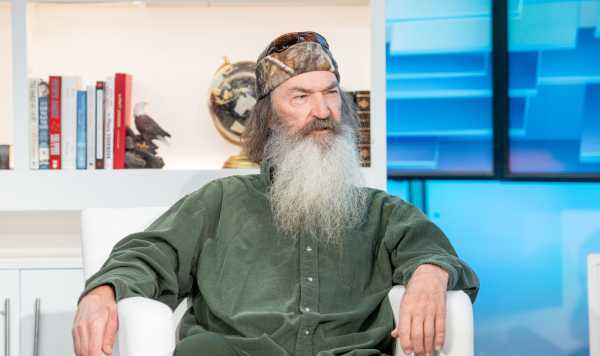The patriarch of the Duck dynasty was an American explorer of faith and family values, and the winding path one sometimes must take to achieve them.

Credit: Roy Rochlin/Getty Images Loading the Elevenlabs Text to Speech AudioNative player…
A dozen black books lie on the arm of an antique chair. The chair is incredibly old and carefully camouflaged, with two large windows in the back that let in sunlight, making it look even more shabby; the printed fabric leaves absorb the light and momentarily smell of the forest. An arm’s length from the chair, ice cubes cool sweet tea in a sweaty Mason jar. Sweating along with him, a man who resembles a child’s Sunday school performance of God the Father, if the child were from northeast Louisiana and God the Father was a swamp dweller. Maybe that’s what he is – “I am the true vine, and my Father is the husbandman.”
The man leafs through the books as time slowly creeps across his face and meets his ashen mustache. The whole room is permeated with the feeling of time; time spent, even rusty. The time imprinted on the pages of these books is undoubtedly in the stories he remembers.
Perhaps this feeling arises only because for the person in the chair, time on Earth has already expired.
It’s a little strange to watch this Realtree interview with Phil Robertson two days after his passing. The video was filmed two years ago, but it feels like Robertson’s complete, finished existence. I think it’s because he seemed ready to go for some time. Even at the height of the Robertson family’s popularity, Duck Dynasty, if he had passed away during filming, he probably would have been ready; content to meet the Lord. In the era of The Golden Bachelor, that kind of peace has become rare among older men. At least among those who appear on television.
However, for Phil Alexander Robertson it was not always like this.
These black books by the recliner are the record of his life’s work: duck hunting. For decades, he has documented every hunt. For the non-hunting reader, that’s about 60 days of hunting every season since the 1980s. Every duck of every breed, in every weather, with the wind blowing from every direction, all recorded after the hunt.
He began recording all these hunts shortly after he founded Duck Commander in 1972, a small business manufacturing duck calls that he handcrafted from Louisiana cedar.
Before that, he was a quarterback at Louisiana Tech in the late ’60s, starting behind the first pick in the 1970 NFL draft and four-time Super Bowl champion Terry Bradshaw, a standout from Shreveport. Even when he played for the Bulldogs — he was pretty good by most accounts — all he ever wanted to do was hunt. Terry Bradshaw told ESPN that Phil “loved hunting more than football. He’d come to practice straight out of the woods with squirrel tails hanging out of his pockets and duck feathers on his clothes.”
One day, the dean of men at Louisiana Tech called Phil into his office for a talk. The university president was in the middle of showing some “dignitaries” around campus when they stopped by Phil’s office, and the dean chastised him: “Mr. Robertson, I have to tell you, when we got to your house, there were nets, duck feathers and blood on the sidewalk, an old deer hide and antlers, and a bunch of old junk.” He finished: “I want you to go out and
Sourse: theamericanconservative.com